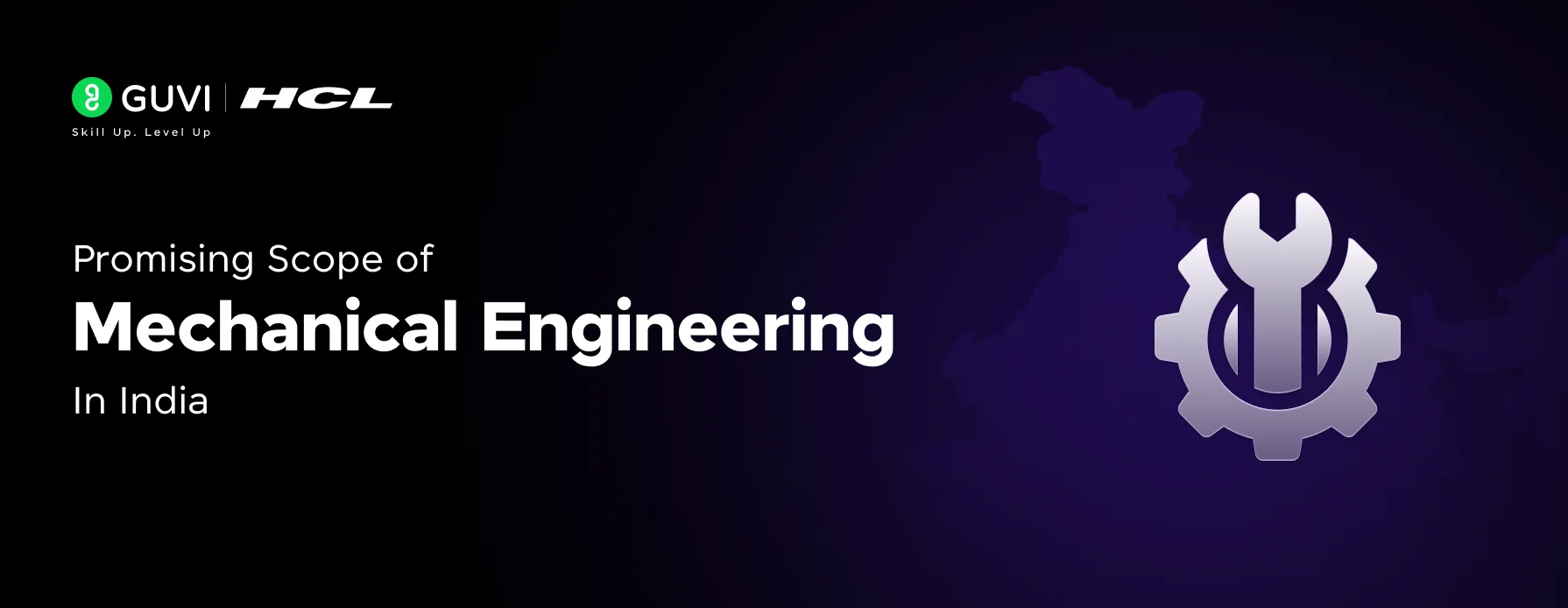
Promising Scope of Mechanical Engineering in India in 2025
Mar 17, 2025 5 Min Read 13231 Views
(Last Updated)
Are you curious about the vast opportunities for mechanical engineers in India? With rapid technological advancements and shifts in industrial needs, the demand for mechanical engineers continues to grow.
From traditional manufacturing to cutting-edge fields like renewable energy, robotics, and aerospace, mechanical engineering offers diverse career paths. Mechanical engineering is the basic block of any industry and without it, nothing can withstand the global requirements.
In this article, we are going to prove to you that the scope of mechanical engineering is still high in India and how it helps in shaping different industries. So, without further ado, let’s get started.
Table of contents
- Scope of Mechanical Engineering in India: Trends and Opportunities
- Trends in Mechanical Engineering
- Opportunities in Mechanical Engineering
- Key Job Roles in Mechanical Engineering
- Design Engineer
- Production/Manufacturing Engineer
- Maintenance Engineer
- Quality Assurance/Quality Control Engineer
- Research and Development (R&D) Engineer
- Project Engineer/Project Manager
- Process Engineer
- Sales and Technical Support Engineer
- Emerging and Specialized Roles
- Factors Driving Job Opportunities
- Conclusion
- FAQs
- What is the future scope of mechanical engineering in India?
- What are some of the top job roles available for mechanical engineers in India?
- How are emerging technologies like Industry 4.0 and additive manufacturing impacting the field?
- What salary range can a mechanical engineer expect in India?
- Beyond traditional roles, what additional opportunities exist for mechanical engineers?
Scope of Mechanical Engineering in India: Trends and Opportunities

Mechanical engineers are the basic foundations of a building and the scope of mechanical engineering in India is remarkable as it is progressing towards development.
In this section, we listed down all the trends and opportunities available for Mechanical Engineering in India:
Trends in Mechanical Engineering
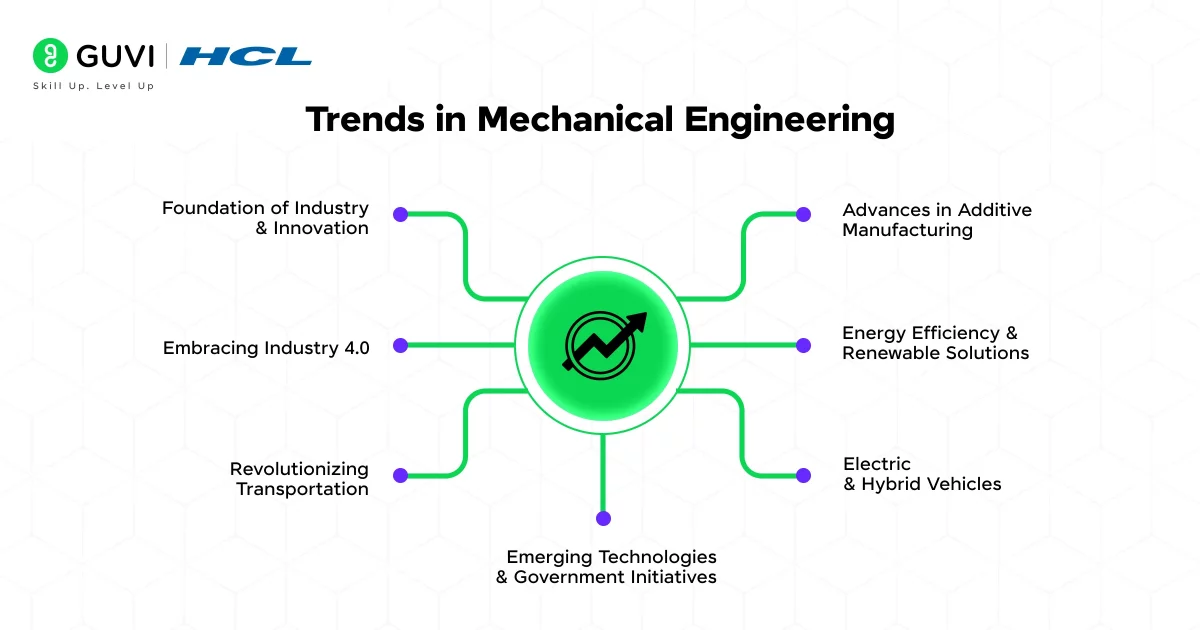
1. Foundation of Industry and Innovation:
Mechanical engineering forms the backbone of various sectors from manufacturing and automotive to aerospace and energy. Its core principles drive the design, analysis, and production of machines and systems that power everyday life, ensuring that industries remain efficient and competitive.
2. Embracing Industry 4.0:
The rise of Industry 4.0 has revolutionized traditional manufacturing by integrating digital technologies such as the Internet of Things (IoT), artificial intelligence (AI), robotics, and big data analytics.
This digital transformation enables the development of smart factories and automated processes, providing mechanical engineers with new challenges and opportunities in designing and managing cutting-edge production systems.
3. Revolutionizing Transportation:
The automotive industry is undergoing a significant shift towards electric and hybrid vehicles. Mechanical engineers are at the forefront of this change, working on innovations like advanced battery systems, lightweight materials, and regenerative braking technologies.
This evolution not only supports sustainable transportation but also aligns with government initiatives promoting greener mobility solutions.
4. Advances in Additive Manufacturing:
Additive manufacturing, or 3D printing, is transforming product design and production. By enabling rapid prototyping and the creation of complex components with minimal waste, this technology is opening new avenues for innovation.
Mechanical engineers leverage these techniques to streamline development cycles and bring novel products to market more efficiently.
5. Energy Efficiency and Renewable Solutions:
With India’s growing commitment to sustainable development, the demand for energy-efficient systems has surged. Mechanical engineers play a critical role in designing and optimizing renewable energy solutions such as solar panels, wind turbines, and advanced HVAC systems.
Their work helps reduce energy consumption and lower the carbon footprint of both industrial operations and residential infrastructures.
6. Electric and Hybrid Vehicles
As the world shifts toward sustainable transportation, electric and hybrid vehicles have gained tremendous traction in India. Companies like Ola, Ather, and Tata pioneering the change and government initiatives such as FAME (Faster Adoption and Manufacture of Electric Vehicles).
7. Emerging Technologies and Government Initiatives
In addition to the above trends, new emerging technologies and proactive government policies are reshaping the mechanical engineering landscape in India:
- Integration with Digital Technologies: Beyond Industry 4.0, mechanical engineers are now leveraging artificial intelligence, big data analytics, and cloud computing to enhance product design and manufacturing processes.
- Advanced Materials and Nanotechnology: There is a growing emphasis on researching and developing lightweight, high-strength, and eco-friendly materials. These advancements are critical in sectors ranging from aerospace to consumer electronics.
- Government Support: Initiatives such as Make in India, Atmanirbhar Bharat, and Skill India are not only creating job opportunities but also encouraging innovation and local manufacturing. This supportive ecosystem is expected to drive further growth and provide ample opportunities for mechanical engineers.
Opportunities in Mechanical Engineering
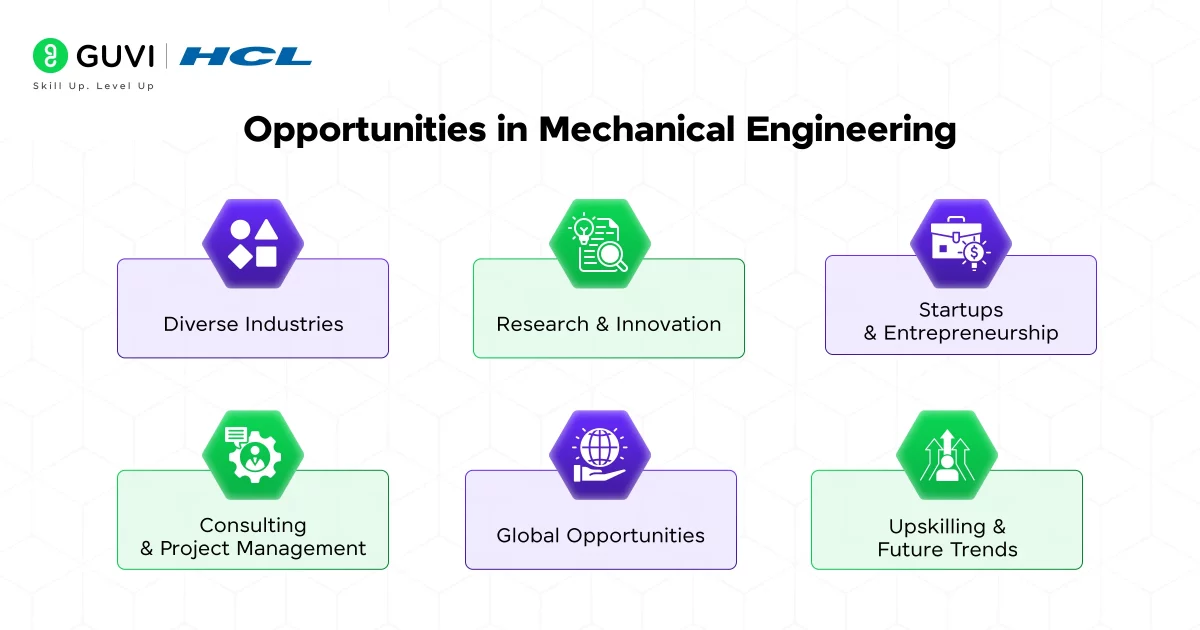
Various career opportunities in Mechanical Engineering let you explore various fields of interest. Here are some of the opportunities that are out there for you:
1. Diverse Industries
As a mechanical engineer, you have the opportunity to work across a wide range of industries from manufacturing and automotive to aerospace, energy, construction, and healthcare.
This diversity means you can specialize in a field that aligns with your interests while applying your core engineering skills to solve real-world problems.
2. Research and Innovation
For those passionate about discovery, mechanical engineering offers abundant opportunities in research and development. Whether you are working on advanced materials for EVs or pioneering new manufacturing techniques, your work can drive significant technological breakthroughs.
Collaboration with academic institutions and industry leaders further enriches this vibrant research ecosystem.
3. Startups and Entrepreneurship
India’s booming startup ecosystem provides mechanical engineers with the chance to innovate and launch their own ventures.
Whether it’s developing a novel medical device, an energy-efficient appliance, or a sustainable packaging solution, the scope for entrepreneurship is vast. Small-scale innovations today can lead to transformative solutions that address long-term challenges.
4. Consulting and Project Management
Mechanical engineers are also in high demand for consulting and project management roles. In these positions, you analyze existing systems, identify efficiency improvements, and oversee complex projects from conception to completion.
Strong technical knowledge combined with leadership skills can lead to rewarding careers in consulting firms and large-scale industrial projects.
5. Global Opportunities
The skills of a mechanical engineer are recognized around the world. Even if you start your career in India, you have ample opportunities to work with multinational companies, research institutions, or academic organizations globally.
This international exposure not only broadens your professional horizons but also enriches your experience by exposing you to diverse engineering practices and cultures.
6. Upskilling and Future Trends
With rapidly evolving technology, continuous learning is essential. Top articles emphasize the importance of pursuing specialized courses, certifications, and training in emerging areas such as AI integration, robotics, and advanced simulation tools.
Staying current through professional development programs and online platforms can significantly boost your career prospects.
Mechanical engineering offers a diverse array of job roles in India, catering to various industries and interests. Whether you’re inclined toward design, manufacturing, research, or management, there’s a role that can match your skills and aspirations. Below is an overview of the primary job roles available for mechanical engineers in India:
Key Job Roles in Mechanical Engineering
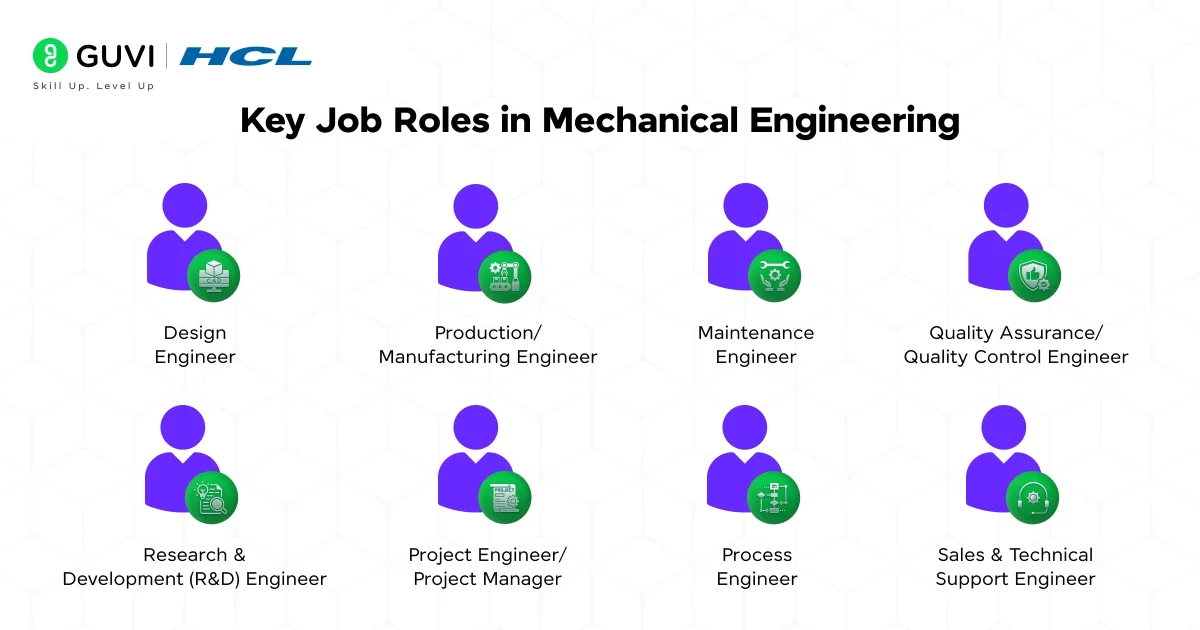
Now that you have seen the trends and opportunities available in mechanical engineering, here’s a quick look through on some of the interesting and key job roles in mechanical engineering
1. Design Engineer
- Role: Develop and improve mechanical components and systems using CAD (Computer-Aided Design) software.
- Industries: Automotive, aerospace, consumer goods, heavy machinery.
- Skills: 3D modeling, simulation, creative problem-solving, understanding of material properties.
- Average Salary: ₹5–7 LPA
2. Production/Manufacturing Engineer
- Role: Oversee the manufacturing process, ensuring that products are produced efficiently, safely, and within quality standards.
- Industries: Automotive, electronics, consumer products, pharmaceuticals.
- Skills: Process optimization, lean manufacturing, quality control, familiarity with automation and robotics.
- Average Salary: ₹5–8 LPA
3. Maintenance Engineer
- Role: Responsible for the upkeep and repair of machinery and equipment, ensuring minimal downtime in production processes.
- Industries: Manufacturing plants, power generation, heavy industries.
- Skills: Troubleshooting, preventive maintenance, knowledge of mechanical and electrical systems.
- Average Salary: ₹4–6 LPA
4. Quality Assurance/Quality Control Engineer
- Role: Monitor production processes and final products to ensure they meet quality standards and regulatory requirements.
- Industries: Automotive, aerospace, consumer goods, electronics.
- Skills: Statistical process control, inspection techniques, problem-solving, adherence to standards like ISO.
- Average Salary: ₹5–7 LPA
5. Research and Development (R&D) Engineer
- Role: Innovate new products, materials, or processes by conducting experiments and testing prototypes.
- Industries: Automotive, aerospace, renewable energy, consumer electronics.
- Skills: Analytical thinking, experimental design, proficiency with simulation software, creative innovation.
- Average Salary: ₹6–8 LPA
6. Project Engineer/Project Manager
- Role: Plan, execute, and oversee projects from conception to completion while coordinating with various teams.
- Industries: Construction, infrastructure, manufacturing, energy.
- Skills: Project management, communication, budgeting, risk management, leadership.
- Average Salary: ₹8–15 LPA
7. Process Engineer
- Role: Optimize industrial processes to improve efficiency, reduce waste, and enhance product quality.
- Industries: Chemical processing, pharmaceuticals, food and beverage, metals.
- Skills: Process mapping, Six Sigma/Lean methodologies, data analysis, system optimization.
- Average Salary: ₹6–8 LPA
8. Sales and Technical Support Engineer
- Role: Act as a bridge between engineering teams and customers by providing technical support and solutions.
- Industries: Industrial equipment, machinery manufacturing, automation systems.
- Skills: Technical knowledge, communication, customer relationship management, and problem resolution.
- Average Salary: ₹4–6 LPA
Emerging and Specialized Roles
- Consulting Engineer: Provide expert advice on complex engineering problems to improve operational efficiency, product design, or system integration.
- Plant Engineer: Manage and optimize plant operations, including process improvements, maintenance, and safety protocols.
- Entrepreneur/Startup Founder: Leverage engineering expertise to innovate new products or services, often in emerging sectors like sustainable technology or smart manufacturing.
- Academia and Research: Many mechanical engineers also find rewarding careers in academia, where they contribute to research and mentor the next generation of engineers.
Factors Driving Job Opportunities
- Industrial Growth: As India’s manufacturing and industrial sectors expand, the need for skilled mechanical engineers continues to rise.
- Government Initiatives: Programs like Make in India, Atmanirbhar Bharat, and Skill India are fostering a robust environment for engineering innovation and manufacturing excellence.
- Technological Advancements: With trends such as Industry 4.0, additive manufacturing, and renewable energy, mechanical engineers are needed more than ever to bridge the gap between traditional engineering principles and modern technology.
The job landscape for mechanical engineers in India is vast and dynamic, offering roles that span across traditional manufacturing to cutting-edge technologies in renewable energy, robotics, and digital manufacturing.
As you know from the blog that CAD design is one of the prominent aspects of mechanical engineering, it is important that you learn it through a recognized institution and gain professional certification. GUVI’s CAD Course for Mechanical Engineering is the right fit which lets you practice hands-on projects with mentors guiding you throughout!
Conclusion
In conclusion, the scope of mechanical engineering in India remains vast and dynamic. Even though computer science has gained tremendous popularity over the past few years, the foundational role of mechanical engineering in driving innovation, industrial progress, and sustainable development is undeniable.
With emerging trends in digital integration, renewable energy, advanced materials, and supportive government initiatives, the future for mechanical engineers in India looks exceptionally promising.
FAQs
Mechanical engineering remains a foundational pillar across industries. With emerging trends like Industry 4.0, additive manufacturing, and the rise of electric vehicles, the field is poised for significant growth.
Government initiatives such as Make in India and Atmanirbhar Bharat further bolster its future prospects by promoting innovation and local manufacturing.
Mechanical engineers can pursue a diverse range of career paths. Key roles include Design Engineer, Production/Manufacturing Engineer, Maintenance Engineer, R&D Engineer, and Project Manager.
These technologies are revolutionizing traditional manufacturing processes. Industry 4.0 integrates digital tools like IoT, AI, and robotics to create smart, efficient systems. Additive manufacturing (3D printing) enables the creation of complex designs with minimal waste, significantly reducing production times and costs.
Salary levels vary based on experience, location, and industry. Generally:
Entry-Level (0-2 years): ₹3–6 lakh per annum
Mid-Level (3-5 years): ₹6–12 lakh per annum
Experienced (6+ years): ₹12–20+ lakh per annum
Salaries in metropolitan areas and specialized industries like aerospace or oil and gas often exceed these ranges.
Mechanical engineers today can also explore roles in research and innovation, consulting, and entrepreneurship. The growing startup ecosystem, coupled with opportunities in renewable energy, medical device design, and global markets, provides a broad spectrum of career paths.


















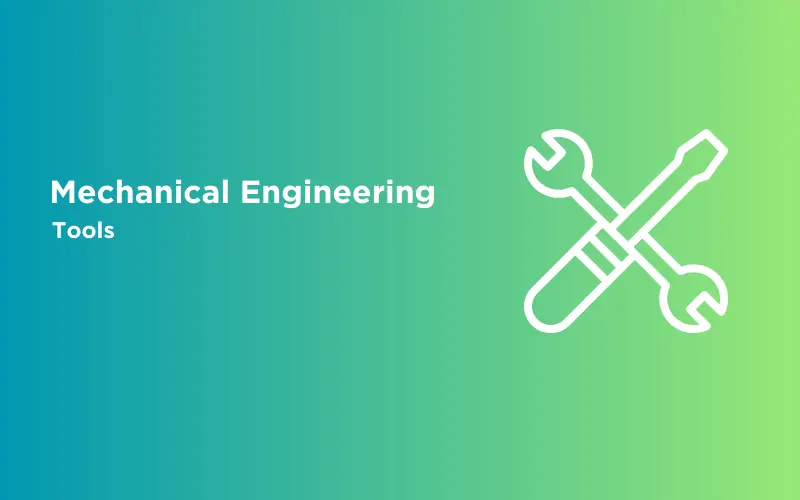



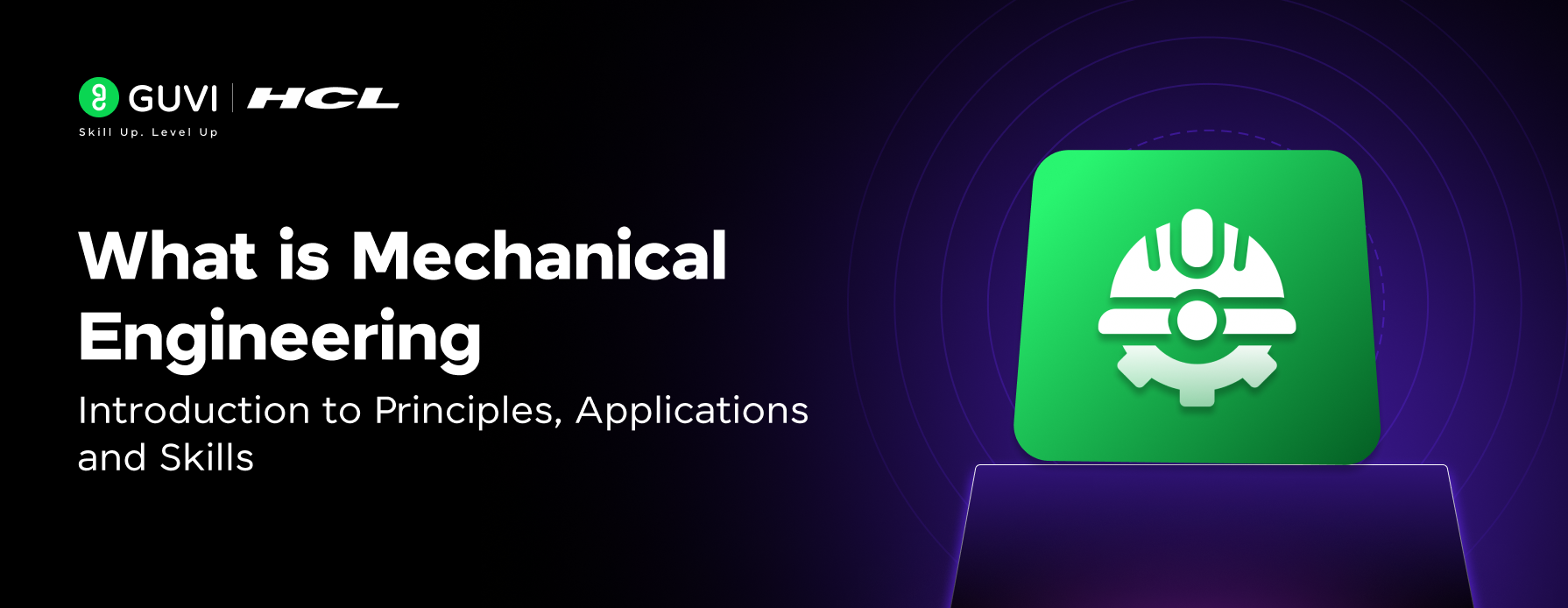





Did you enjoy this article?